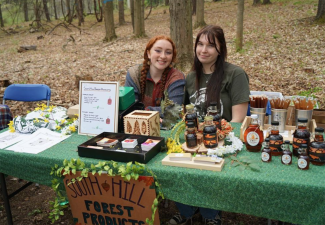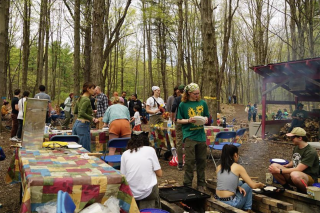In most classes at Ithaca College, final projects take the form of papers and presentations. But in the Farming the Forest: Non-Timber Forest Products (NTFP) class, taught by environmental studies professor Jason Hamilton, students make maple syrup, beeswax candles, and wood carvings to sell through a business, South Hill Forest Products. The course allows students to get hands-on, real-world skills by creating the products and running the business, which began in 2010. The proceeds from sales in the online store help to cover the upcoming year’s costs.
Goods from South Hill Forest Products were available at an open house held on Earth Day at a sugar bush—a stand of maple trees used to make maple syrup—that borders the IC Natural Lands. Nearly 300 people attended the Earth Day celebration, eating pancakes served with the student-made maple syrup and enjoying yard games, live music, and face painting.
The event was a fitting way to end the semester and showcase all the work the students put into the course throughout the year. “It was nice to celebrate all of the hard work of the students who participated in the sugar bush and a great way to share with the rest of school and Ithaca community,” said Julie Wilson ’23.



